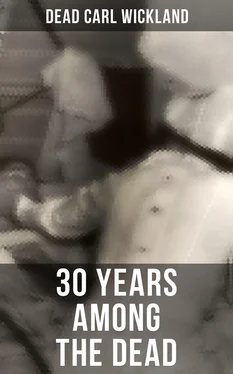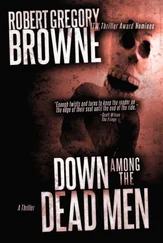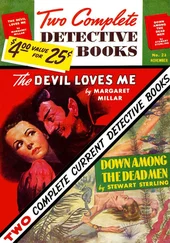Dead Carl Wickland - 30 Years Among the Dead
Здесь есть возможность читать онлайн «Dead Carl Wickland - 30 Years Among the Dead» — ознакомительный отрывок электронной книги совершенно бесплатно, а после прочтения отрывка купить полную версию. В некоторых случаях можно слушать аудио, скачать через торрент в формате fb2 и присутствует краткое содержание. Жанр: unrecognised, на английском языке. Описание произведения, (предисловие) а так же отзывы посетителей доступны на портале библиотеки ЛибКат.
- Название:30 Years Among the Dead
- Автор:
- Жанр:
- Год:неизвестен
- ISBN:нет данных
- Рейтинг книги:3 / 5. Голосов: 1
-
Избранное:Добавить в избранное
- Отзывы:
-
Ваша оценка:
- 60
- 1
- 2
- 3
- 4
- 5
30 Years Among the Dead: краткое содержание, описание и аннотация
Предлагаем к чтению аннотацию, описание, краткое содержание или предисловие (зависит от того, что написал сам автор книги «30 Years Among the Dead»). Если вы не нашли необходимую информацию о книге — напишите в комментариях, мы постараемся отыскать её.
30 Years Among the Dead — читать онлайн ознакомительный отрывок
Ниже представлен текст книги, разбитый по страницам. Система сохранения места последней прочитанной страницы, позволяет с удобством читать онлайн бесплатно книгу «30 Years Among the Dead», без необходимости каждый раз заново искать на чём Вы остановились. Поставьте закладку, и сможете в любой момент перейти на страницу, на которой закончили чтение.
Интервал:
Закладка:
Dead Carl Wickland
30 Years Among the Dead
Published by

Books
- Advanced Digital Solutions & High-Quality eBook Formatting -
musaicumbooks@okpublishing.info
2021 OK Publishing
EAN 4066338112699
Table of Contents
Chapter I Inter-Relationship of the Two Worlds
Chapter II Psychical Research
Chapter III Subconscious Mind and Auto-Suggestion Hypotheses Untenable
Chapter IV Earth Sphere Conditions and the Magnetic Aura
Chapter V Tormenting Spirits Marriage Disturbances
Chapter VI Spirits and Crime
Chapter VII Spirits and Suicide
Chapter VIII Spirits and Narcotics, Inebriety, Amnesia
Chapter IX Psychic Invalidism
Chapter X Orphans
Chapter XI Materialism and Indifference
Chapter XII Selfishness
Chapter XIII Orthodoxy
Chapter XIV Christian Science
Chapter XV Theosophy
Chapter XVI Philosophy
Chapter XVII Conclusion
Chapter I
Inter-Relationship of the Two Worlds
Table of Contents
The reality of an invisible world surrounding the physical world is for many difficult to comprehend, since the mind sphere is often limited to the visible and tangible; however, it requires but little thought to realize the constant change of matter as it occurs in three forms, solid, liquid and gaseous, in its range back and forth between the visible and invisible.
Visible nature is but the invisible, the Real, made manifest through a combination of its elements; science informs us that fully ninety-five per cent of vegetation is derived out of the air, or atmosphere. Is not mankind living at the bottom of an invisible ocean, the atmosphere, which is even more important to physical existence than any of the visible physical substances, since life can continue but a few moments out of it?
Nitrogen gas, constituting the greater bulk of the atmosphere, enters vitally into vegetable and animal growth and existence. Hydrogen and oxygen gases are constantly changing from a state of invisible vapor to visible and solid form. Carbon offers another example of similar transformation. Sounds, odors, the thermic law of heat and cold. and multitudes of other phenomena, ranging from the infinitesimal electron to the energy which moves the planets and suns, are all intangible, invisible factors.
All activities, whether chemical, vital or mental, operate invisibly, as observed in chemical affinity, in energy, in plant life, in animal life, in intelligence and mentalization. So in every department of our manifest physical nature it is evident that all elements have their root and permanence in the invisible. The invisible is the source of the visible.
Thus when we realize that the objective is only a combination of invisible substances and forces, the existence of an unseen world is readily comprehensible. Considering the wonderful advancement of science into the field of nature's finer forces, it is inconceivable that any thinking mind can fail to recognize the rationale of the independent existence of the human spirit apart for the physical body. No subject has been better authenticated through the ages and in all literature than that of spirit existence and a future life.
Fiske, the historian, says: “Among all races of men, as far as can now be determined, ancestor worship” (contact with the spirits of the departed) “was the earliest form of worship . . . prevailing in Africa, Asia, China, Japan, among the Aryans of Europe and the American Indian tribes.”
Allen, in his “History of Civilization” writes: “Rude tribes the world over are found to have ideas of a human soul, a spirit world, and generally a belief in immortality. Savages consider the next life simply a continuation of this; they also recognize an other self which has mysterious powers. Death is the abandoning of the body by this mysterious other self, which is conceived of as still existing in the near neighborhood. The loves and hates of this world are transferred to the spirit world.”
Confucius said: “Bemoan not the departed with excessive grief. The dead are devoted and faithful friends; they are ever associated with us.”
The writers of classic times - Socrates, Herodotus, Sophocles, Euripides, Plato, Aristotle, Horace, Virgil, Plutarch, Josephus, Maximus of Tyre - repeatedly refer to spirit
existence as a well known fact. Cicero wrote: “Is not almost all heaven filled with the human? Those very gods themselves had their original here below, and ascended from hence into heaven.”
That early Christianity recognized spirits is too well authenticated in the writings of St. Anthony, Tertullian, Origen and their contemporaries to require emphasis.
The Bible is replete with references to spirit existence. “We also are compassed about with so great a cloud of witnesses.” Heb. 12:1. “Beloved, believe not every spirit, but try the spirits, whether they are of God.” 1 John 4:1. “The spirits of just men made perfect.” Heb. 12:23. “There is a natural body and there is a spiritual body . . . First that which is natural, and afterward that which is spiritual.” 1 Cor. 15:44, 46. Many other similar biblical citations might be given.
Swedenborg contributed volumes on this subject. Dr. Samuel Johnson said: “I do not believe in spirits - I have seen too many of them.”
John Wesley wrote in “The Invisible World”: “It is true that the English in general -indeed most of the men of learning in Europe - have given up all accounts of witches and apparitions as mere old wives' fables. I am sorry for it, and I willingly take this opportunity to offer my solemn protest against this violent compliment which so many that believe in the Bible pay to those who do not believe it. Such belief is in direct opposition, not only to the Bible, but to the suffrage of the wisest and best of men in all ages and nations. They well know that the giving up of witchcraft is in effect giving up the Bible.”
That psychic phenomena occurred at the house of Mr. Samuel Wesley, father of Rev. John Wesley, at Epworth, and continued with noises and disturbances of various kinds for many months, is well known.
Shakespeare, Milton, Wordsworth, Tennyson, Longfellow, and many other poets wrote with profound understanding of the continued existence of man.
We are all familiar with the convincing results of the psychical research work of modern scientists, philosophers, ministers, physicians, psychologists and other investigators - Prof. Crookes, Alfred Wallace, Sir Oliver Lodge, Sir Arthur Conan Doyle, Rev. R. J. Campbell, Archdeacon Colley, Rev. Newton, Rev. Savage, W. T. Stead, Camille Flammarion, Dr. Baraduc, Dr. Janet, Prof.Richet, Cesare Lombroso, Dr.
Hodgson, Dr. I. K. Funk, Prof. James, Prof. Hyslop, Dr. Carrington and many others.
Dr. Thomas J. Hudson, author of “The Law of Psychic Phenomena,” wrote: “The man who denies the phenomena of spiritualism today is not entitled to be called a skeptic, he is simply ignorant.”
The Rev. Dr. George M. Searle, Rector of the Catholic Church of St. Paul the Apostle, New York City, said: “The reality of the existence of spirits in modern spiritism is no longer an open question, even among scientific men who have examined the subject. Any one who considers the manifestation of them as mere humbug, trickery or delusion, is simply not up to date.”
“In our times no one denies the real existence of spiritualistic facts, except a few who live with their feet on the earth and their brains in the moon,” wrote G. G. Franco, S. J., in “Civilta Cattolica.” “Spiritistic phenomena are external facts which fall within the range of the senses and can easily be observed by all, and when such facts are attested by so many well informed and credible witnesses, it is useless, as well as foolish and ridiculous, to fight against proved evidence. The facts remain assured, even for reasonable men.”
Читать дальшеИнтервал:
Закладка:
Похожие книги на «30 Years Among the Dead»
Представляем Вашему вниманию похожие книги на «30 Years Among the Dead» списком для выбора. Мы отобрали схожую по названию и смыслу литературу в надежде предоставить читателям больше вариантов отыскать новые, интересные, ещё непрочитанные произведения.
Обсуждение, отзывы о книге «30 Years Among the Dead» и просто собственные мнения читателей. Оставьте ваши комментарии, напишите, что Вы думаете о произведении, его смысле или главных героях. Укажите что конкретно понравилось, а что нет, и почему Вы так считаете.












